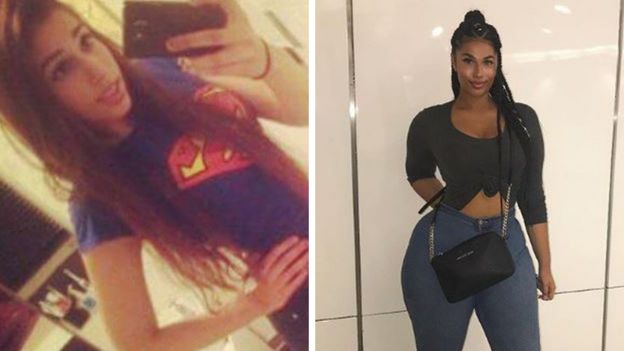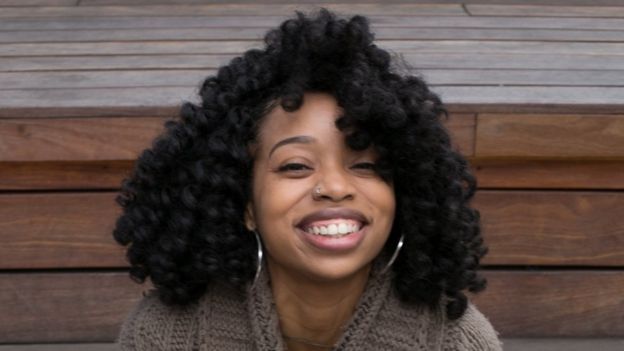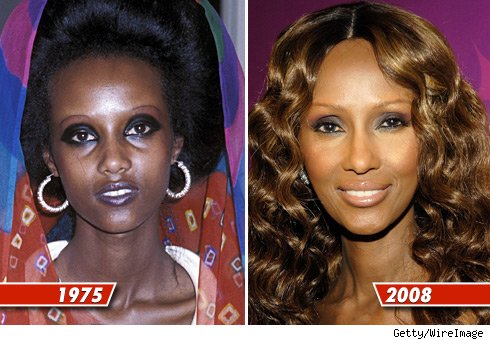If black women can use lightening creams to look like white women, then why can't white women tan themselves and become black women? This is hypocrisy!!!

"I've had no surgery, so I can't take off these lips. I can't remove my 'fake bum implants'."
Over the past month Aga Brzostowska has been labelled a "blackfish".
It's a term used for someone accused of pretending to be black or mixed-race on social media.
The suggestion Aga has been faking her race is news to her.
The 20-year-old University of Birmingham student told Radio 1 Newsbeat her skin is naturally "not pale". But she does admit to making it darker.
"With things like tanning, I don't think I've done anything in a malicious way.
"So I don't feel like I need to stop doing something because... why would I stop doing something that's benefitting me or that I enjoy doing?" Aga, who asked to be referred to as Alicja, says.
She says she's not suggesting "white privilege is not a thing" - but wants to tell her critics "the assumptions you're making are wrong".
Alicja is just one of a number of white Instagram influencers who've been accused of changing their features to make themselves look more like black women.
People have pointed in their pictures they have darker skin, fuller lips, bigger thighs and bums, and hairstyles that include curls and braids.
Sweden's Emma Hallberg, who has more than 260,000 Instagram followers, is the most infamous.
She had to defend herself after two photos of her went viral on social media.

"I do not see myself as anything else than white," Emma told Buzzfeed. "I get a deep tan naturally from the sun."
Emma's defence is similar to the two women accused of blackfishing spoken to by Newsbeat.
Alicja admits that two pictures of her which were doing the rounds on Twitter - one from when she was 13 and one taken recently - don't look good for her.
"I understand why the Twitter thread was made. And it makes sense to use my pictures, because without looking at anything or knowing me, it makes sense to put those two pictures together because obviously you can see a mad difference - a crazy difference.
"So I'm not really upset at the fact that someone used the pictures without knowing me. It makes sense of what they were trying to get across."
Alicja claims the differences in her appearance shown in the two pictures is completely natural - the result of hard work in the gym, and being fresh back from holiday - braids included.
And she thinks part of the reason people are surprised when they find out she's white is down to "stereotypes" about what Polish people look like.
"I'm proud to be Polish but I don't know why I look like this - my features are just there. I can't help that I have big lips and not the stereotypical Polish features," she says.
As for the braids, Alicja says her friend's little sister had started a hair company and wanted to use her head for pictures.
"I didn't really think much of it. I really appreciate the culture and I really just love the look - that was literally it."
Why is this a big deal?
Blackfishing has been talked about a lot ever since writer Wanna Thompson's Twitter thread - which highlighted women accused of blackfishing - went viral last month.
Some people have been questioning why it's an issue.
Dara Thurmond, a nurse from New York who's been vocal about blackfishing, told Radio 1 Newsbeat that black people "just being ourselves" has "always been frowned upon".
She says her frustration comes when white women who appear to be posing as black don't know "the struggle that black women go through just to be accepted as who they are".

Dara says black influencers are being "pushed to the side" by girls who are blackfishing
"Even now in certain work spaces, black women can't wear their natural hair out. They have to wear weave.
"They have to press their hair so that it's straight, because to wear an afro or to wear braids or to wear locks is seen as unclean or untidy - it's not professional."
She says women accused of blackfishing are being "unfair" to black women who are trying to make it as influencers and get product endorsements of their own.
"You take away from them," Dara says.
Jaiden Gumbayan is 19, from Jacksonville, Florida, and has also been accused of blackfishing.
Like Alicja, she says she understands some of the backlash against her, but denies pretending to be a different race to her own.
She believes there's a "fine line between appreciation and appropriation".
"It could be looked at as the biggest form of flattery to some black women or people of colour, and to others it's mimicking and taking their culture without knowing the history behind it," she says.
"I know that there are other influencers on Instagram, and other celebrities... that is their intention."
A name that's been mentioned in almost everything written online about blackfishing is Kardashian.
It's because Kim, in particular, has been accused of appropriating black culture on several occasions down the years.
Read the rest on;

"I've had no surgery, so I can't take off these lips. I can't remove my 'fake bum implants'."
Over the past month Aga Brzostowska has been labelled a "blackfish".
It's a term used for someone accused of pretending to be black or mixed-race on social media.
The suggestion Aga has been faking her race is news to her.
The 20-year-old University of Birmingham student told Radio 1 Newsbeat her skin is naturally "not pale". But she does admit to making it darker.
"With things like tanning, I don't think I've done anything in a malicious way.
"So I don't feel like I need to stop doing something because... why would I stop doing something that's benefitting me or that I enjoy doing?" Aga, who asked to be referred to as Alicja, says.
She says she's not suggesting "white privilege is not a thing" - but wants to tell her critics "the assumptions you're making are wrong".
Alicja is just one of a number of white Instagram influencers who've been accused of changing their features to make themselves look more like black women.
People have pointed in their pictures they have darker skin, fuller lips, bigger thighs and bums, and hairstyles that include curls and braids.
Sweden's Emma Hallberg, who has more than 260,000 Instagram followers, is the most infamous.
She had to defend herself after two photos of her went viral on social media.

"I do not see myself as anything else than white," Emma told Buzzfeed. "I get a deep tan naturally from the sun."
Emma's defence is similar to the two women accused of blackfishing spoken to by Newsbeat.
Alicja admits that two pictures of her which were doing the rounds on Twitter - one from when she was 13 and one taken recently - don't look good for her.
"I understand why the Twitter thread was made. And it makes sense to use my pictures, because without looking at anything or knowing me, it makes sense to put those two pictures together because obviously you can see a mad difference - a crazy difference.
"So I'm not really upset at the fact that someone used the pictures without knowing me. It makes sense of what they were trying to get across."
Alicja claims the differences in her appearance shown in the two pictures is completely natural - the result of hard work in the gym, and being fresh back from holiday - braids included.
And she thinks part of the reason people are surprised when they find out she's white is down to "stereotypes" about what Polish people look like.
"I'm proud to be Polish but I don't know why I look like this - my features are just there. I can't help that I have big lips and not the stereotypical Polish features," she says.
As for the braids, Alicja says her friend's little sister had started a hair company and wanted to use her head for pictures.
"I didn't really think much of it. I really appreciate the culture and I really just love the look - that was literally it."
Why is this a big deal?
Blackfishing has been talked about a lot ever since writer Wanna Thompson's Twitter thread - which highlighted women accused of blackfishing - went viral last month.
Some people have been questioning why it's an issue.
Dara Thurmond, a nurse from New York who's been vocal about blackfishing, told Radio 1 Newsbeat that black people "just being ourselves" has "always been frowned upon".
She says her frustration comes when white women who appear to be posing as black don't know "the struggle that black women go through just to be accepted as who they are".

Dara says black influencers are being "pushed to the side" by girls who are blackfishing
"Even now in certain work spaces, black women can't wear their natural hair out. They have to wear weave.
"They have to press their hair so that it's straight, because to wear an afro or to wear braids or to wear locks is seen as unclean or untidy - it's not professional."
She says women accused of blackfishing are being "unfair" to black women who are trying to make it as influencers and get product endorsements of their own.
"You take away from them," Dara says.
Jaiden Gumbayan is 19, from Jacksonville, Florida, and has also been accused of blackfishing.
Like Alicja, she says she understands some of the backlash against her, but denies pretending to be a different race to her own.
She believes there's a "fine line between appreciation and appropriation".
"It could be looked at as the biggest form of flattery to some black women or people of colour, and to others it's mimicking and taking their culture without knowing the history behind it," she says.
"I know that there are other influencers on Instagram, and other celebrities... that is their intention."
A name that's been mentioned in almost everything written online about blackfishing is Kardashian.
It's because Kim, in particular, has been accused of appropriating black culture on several occasions down the years.
Read the rest on;



